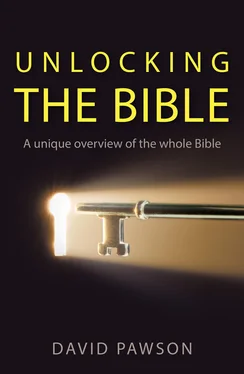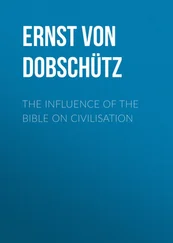The concept of micro-evolution is that there has been limited change within certain animal groups, e.g. the horse or dog group. Science has certainly proved that micro-evolution does take place.
Macro-evolution, by contrast, is the theory that all animals came from the same origin and that all are related. They all go back to the same simple form of life. This is not change within individual species, therefore, but a belief that all species developed from one another.
The final term to consider is struggle. In the context of evolution it refers to the ‘survival of the fittest’.
I am not going to argue the case for or against evolution, except to point out that evolution is still a theory. It has not been proven and, in fact, the more evidence we get from fossils the less it looks like being an adequate theory to account for the different forms of life which arose.
1 In the fossil evidence, groups classified separately under evolutionary theory actually appear simultaneously in the Cambrian period. They do not appear gradually over different ages, they appear almost together.
2 Complex and simple forms of life appear together. There is not a sequence from the simple to the complex.
3 There are very, very few ‘bridge’ fossils that are halfway between one species and another.
4 All life forms are very complicated: they have always had DNA.
5 Mutations, the sudden changes which are purported to account for the development from one species to the next, usually lead to deformities and cause creatures to die out.
6 Interbreeding usually leads to sterility.
7 Above all, when the statistical probabilities are analysed, quite apart from the other objections, there is not enough time for all the varieties of life form to have developed.
The theory of evolution is not merely of academic interest, of course. How we each understand our origins has an effect on how we view mankind as a whole. Leaders infected by evolutionist philosophy have had a considerable impact.
Basic to the evolutionist theory is the concept of the survival of the fittest and the struggle which all species face to survive. This is found in some of the philosophies which have shaped our civilized society, and it has caused untold suffering. American capitalists such as John D. Rockefeller have said, ‘Business is the survival of the fittest.’ A similar outlook is found in fascism: Adolf Hitler’s book was called Mein Kampf, ‘My Struggle’. He believed in the survival of the fittest, the ‘fittest’ being in his view the German Aryan race. It is also found in communism. Karl Marx wrote about the ‘struggle’ between the bourgeoisie and the proletariat, which he believed must issue in revolution. The word ‘struggle’ could also be written across the early days of colonialism, when people were simply wiped out in the name of progress.
In short, the idea of the survival of the fittest when applied to human beings has caused more suffering than any other concept in modern times. But it has also faced us with two huge choices as to what we believe.
MENTAL CHOICE
It faces us first with a mental choice. If you believe in creation you believe in a father God. If you believe in evolution you tend to go for mother nature (a lady who does not exist). If you believe in creation you believe that this universe was the result of a personal choice. If you believe in evolution, you will argue that it was a random, impersonal chance. There was a designed purpose under creation, but under evolution only a random pattern. With creation the universe is a supernatural production, in evolution it is a natural process. Under creation the whole universe is an open situation, open to personal intervention by both God and man. In evolution we have nature as a closed system that operates itself. In creation we have the concept of providence, that God cares for his creation and provides for it and looks after it. But with evolution we simply have coincidence: if anything good happens it is merely the result of chance. With creation we have a faith based on fact, with evolution a faith based on fancy (for it is just a theory). If we accept creation then we accept that God is free to make something and to make man in his image. If we accept evolution we are left with the view that man is free to make God in whatever image he chooses out of his imagination. Accepting one or the other, therefore, has considerable ramifications.
MORAL CHOICE
There is also a moral choice behind accepting creation or evolution. Why is it that people seize on the theory of evolution and hold onto it so fanatically? The answer is that it is the only real alternative if you want to believe that there is no God over us. Under creation God is Lord, under evolution man is Lord. With creation we are under divine authority, but if there is no God we are autonomous as humans and can decide things for ourselves. If we accept God as creator we accept that there are absolute standards of right and wrong. But with no God under evolution, we only have relative situations. With God’s world we talk of duty and responsibility, with evolution we talk of demands and rights. Under God we have an infinite dependence, we become as little children and speak to the heavenly father. With evolution we are proud of our independence, we speak of coming of age, of no longer ‘needing’ God. According to the Bible, man is a fallen creature. According to evolution he is rising and progressing all the time. In the Bible we have salvation for the weak. In evolutionary philosophy we have the survival of the strong.
Nietzsche, the philosopher behind the thought in Hitler’s Germany, said he hated Christianity because it kept weak people going and looked after the sick and dying. The Bible teaches that you are powerful when you do what is right, but evolutionary philosophy leads to a ‘might is right’ outlook. One leads to peace, the other to war. Where evolutionism says you should indulge yourself, look after number one, the Bible says that faith, hope and love are the three main virtues in life. Ultimately the Bible leads us to heaven, whereas evolution promises little – fatalism, helplessness and luck – and leads to hell.
The Fall
When God finished creating our world he said that it was very good. Few today would say that it is a very good world now. Something went wrong. Genesis 3 describes for us what the problem is and how it arose.
There are three undeniable facts about our existence today:
1 Birth is painful.
2 Life is hard.
3 Death is certain.
Why is this? Why is birth painful? Why is life hard? Why is death certain?
Philosophy gives us many different answers. Some philosophers say there must be a bad God as well as a good one. More frequently, they say that the good God made a bad job of it and try to find in that some explanation for the origin of evil. Genesis 3 gives us four vital insights into this problem.
1 Evil was not always in the world.
2 Evil did not start with human beings.
3 Evil is not something physical, it is something moral. Some philosophers have said that it is the material part of the universe that is the source of evil, or in personal terms it is your body that is the source of temptation.
4 Evil is not a thing that exists on its own. It is an adjective rather than a noun. Evil as such does not exist, it is only persons who can be or become evil.
So what does Genesis 3 have to teach us on the subject? It is worth reminding ourselves that this is a real event in real history: we are given both the place and the time of it. At the dawn of human history a gigantic moral catastrophe took place.
The problem starts with a speaking reptile (more a lizard than a snake because it had legs, despite conventional wisdom; it was only later that God made the serpent slither on its belly). How are we to understand this extraordinary story of the snake speaking to Eve? There are three possibilities:
Читать дальше











